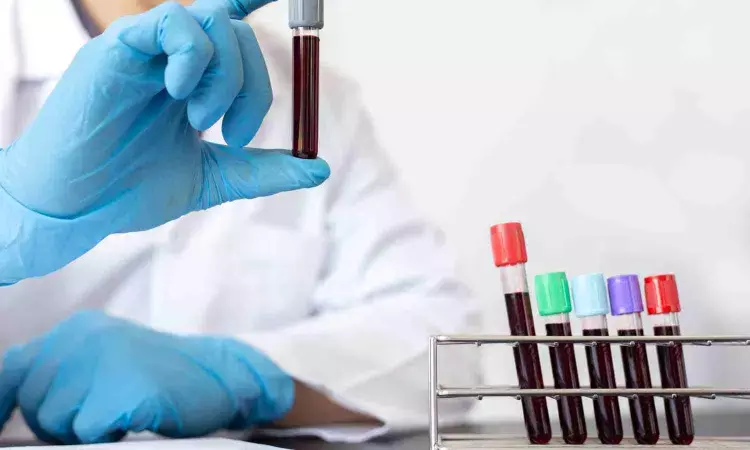- Home
- Medical news & Guidelines
- Anesthesiology
- Cardiology and CTVS
- Critical Care
- Dentistry
- Dermatology
- Diabetes and Endocrinology
- ENT
- Gastroenterology
- Medicine
- Nephrology
- Neurology
- Obstretics-Gynaecology
- Oncology
- Ophthalmology
- Orthopaedics
- Pediatrics-Neonatology
- Psychiatry
- Pulmonology
- Radiology
- Surgery
- Urology
- Laboratory Medicine
- Diet
- Nursing
- Paramedical
- Physiotherapy
- Health news
- Fact Check
- Bone Health Fact Check
- Brain Health Fact Check
- Cancer Related Fact Check
- Child Care Fact Check
- Dental and oral health fact check
- Diabetes and metabolic health fact check
- Diet and Nutrition Fact Check
- Eye and ENT Care Fact Check
- Fitness fact check
- Gut health fact check
- Heart health fact check
- Kidney health fact check
- Medical education fact check
- Men's health fact check
- Respiratory fact check
- Skin and hair care fact check
- Vaccine and Immunization fact check
- Women's health fact check
- AYUSH
- State News
- Andaman and Nicobar Islands
- Andhra Pradesh
- Arunachal Pradesh
- Assam
- Bihar
- Chandigarh
- Chattisgarh
- Dadra and Nagar Haveli
- Daman and Diu
- Delhi
- Goa
- Gujarat
- Haryana
- Himachal Pradesh
- Jammu & Kashmir
- Jharkhand
- Karnataka
- Kerala
- Ladakh
- Lakshadweep
- Madhya Pradesh
- Maharashtra
- Manipur
- Meghalaya
- Mizoram
- Nagaland
- Odisha
- Puducherry
- Punjab
- Rajasthan
- Sikkim
- Tamil Nadu
- Telangana
- Tripura
- Uttar Pradesh
- Uttrakhand
- West Bengal
- Medical Education
- Industry
Calcitriol did not improve bone quality and strength in kidney transplant patients on corticosteroid-sparing immunosuppression: Study

GMCH Chandigarh Upgrades Diagnostic Capabilities with Cutting-Edge Technology
A new study published in the Journal of Bone and Mineral Research showed that calcitriol administration to kidney transplant recipients on corticosteroid-sparing immunosuppression increased the risk of hypercalcemia but did not stop bone loss. Therefore, if vitamin D levels are sufficient, regular usage might not be required.
A considerable proportion of individuals who get kidney transplants have poor bone mineral density (BMD). Because of the effects of medications and changes in metabolism, kidney transplant patients are more likely to experience bone loss. According to prospective studies, bone loss occurs quickly in the first 6 months following renal transplantation (RT). Thus, Pascale Khairallah and colleagues thus undertook this study with the idea that by inhibiting PTH and bone remodeling, calcitriol treatment during the first year after transplantation would preserve the cortical skeleton in recipients treated without corticosteroids.
For 12 months following transplantation, 67 patients aged ≥18 years on an immunosuppressive regimen that spares corticosteroids were randomized to receive daily calcitriol 0.5 mcg or a placebo in this study. As determined by HR-pQCT, the main outcome was the percentage change in cortical density at the radius and tibia from before to after calcitriol administration in comparison to a placebo.
DXA was used to measure areal BMD. HR-pQCT was used to evaluate microarchitecture, cortical and trabecular volumetric BMD, and total estimated bone strength. At baseline, 1 month, and 12 months, blood samples were collected for bone metabolic indicators. The goal of every main analysis was to treat. Hypercalcemia and the development of vascular calcifications were evaluated for safety.
A total of 29 individuals got a placebo, and 32 people received calcitriol, where 27participants of each group finished the trial. The majority of participants were Caucasian men. All locations' baseline Z-scores were within 0.5 SD of the population average. Serum levels of bone markers, microarchitecture or bone strength, areal BMD, and volumetric BMD did not change between groups at 12 months after transplantation.
Serum bone indicators showed a reduced anabolic response over a 12-month period in participants when compared to those without bone loss. The calcitriol group had greater levels of hypercalcemia than the placebo group (p<.001). Scores for arterial calcification did not change. Overall, while calcitriol did not increase bone strength or quality in kidney transplant patients on corticosteroid-sparing immunosuppression, it was linked to increased rates of hypercalcemia in this research.
Reference:
Khairallah, P., Cortez, N. E., McMahon, D. J., Sammons, S., Agarwal, S., Crew, R. J., Cohen, D. J., Dube, G. K., Mohan, S., Chang, J.-H., Morris, H. K., Fernandez, H. E., Aponte, M. A., Adebayo, A. O., Aghi, A., Zaninotto, M., Plebani, M., Tripepi, G., Gallieni, M., … Nickolas, T. L. (2025). Calcitriol supplementation after kidney transplantation: Results of a double-blinded, randomized, placebo-controlled trial. Journal of Bone and Mineral Research: The Official Journal of the American Society for Bone and Mineral Research. https://doi.org/10.1093/jbmr/zjaf044
Neuroscience Masters graduate
Jacinthlyn Sylvia, a Neuroscience Master's graduate from Chennai has worked extensively in deciphering the neurobiology of cognition and motor control in aging. She also has spread-out exposure to Neurosurgery from her Bachelor’s. She is currently involved in active Neuro-Oncology research. She is an upcoming neuroscientist with a fiery passion for writing. Her news cover at Medical Dialogues feature recent discoveries and updates from the healthcare and biomedical research fields. She can be reached at editorial@medicaldialogues.in
Dr Kamal Kant Kohli-MBBS, DTCD- a chest specialist with more than 30 years of practice and a flair for writing clinical articles, Dr Kamal Kant Kohli joined Medical Dialogues as a Chief Editor of Medical News. Besides writing articles, as an editor, he proofreads and verifies all the medical content published on Medical Dialogues including those coming from journals, studies,medical conferences,guidelines etc. Email: drkohli@medicaldialogues.in. Contact no. 011-43720751


